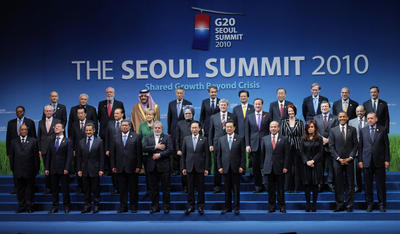On balance the answer is yes. As summits are supposed to, leaders had previously directed the relevant international agencies to produce financial regulatory reform, which the Basel institutions have done. New higher capital and liquidity requirements will be implemented and a new twist was added at the meeting when the largest cross-border institutions, now known as the G-sifis (global systemically important financial institutions), were not hit with a capital surcharge but with much closer scrutiny by their own and international colleges of regulators.
Finance ministers and central bank governors also reformed IMF governance as they were asked to do, giving China third spot in the pecking order and bringing Brazil and India into the top ten.
In another positive surprise, trade negotiators were tasked with completing the Doha trade talks in 2011 as leaders said: ‘We now need to complete the end game.’ We shall see…
On rebalancing, one can argue there was also progress despite Brazil’s unhelpful red herring about a currency war. The IMF’s mutual assessment process is prodding governments along and the leaders’ summit rhetoric conveyed a deeper appreciation that rebalancing requires both domestic policy reforms as well as currency adjustments. Not one or the other.
There is a lot at stake. Rebalancing cannot be achieved overnight. But it can be achieved through time and new developments in both China and the United States signal potential changes in domestic policies which, if implemented, would be aligned with the collective interest in rebalancing for good domestic reasons.
In mid-October, the outlines of China’s 12th Five Year Plan were approved by the party leadership foreshadowing a major thrust to rebalance demand towards domestic sources like consumption rather than continue past unsustainable levels of investment in export-oriented industrial capacity. Leaders also recognise that exchange rate appreciation will help things along. So far, however, they are willing to rely mainly on stealth through real appreciation rather than the more visible nominal appreciation that powerful political interests contest.
In the United States the co-chairs of the bipartisan fiscal responsibility commission have published their own findings and recommendations ahead of the full commission’s final report due December 1. They stress the seriousness of the US fiscal position and the hard choices Americans will have to make to solve it, not just by cutting spending as many Americans seem to believe , but with revenue increases as well. The initial reaction on all sides was furious – which suggests the co-chairs have been even-handed in stating the case. If he chooses to use it, the commission has handed President Obama an opportunity to restore America’s economic credibility in the world.
At Seoul, US authority and overall momentum on cooperative rebalancing were undermined by the negative reaction to the unfortunately-timed (and uncoordinated) quantitative easing by the US Federal Reserve aimed at preventing a possible deflationary spiral at a time of fiscal policy paralysis. A depreciating dollar and the prospect of continued zero interest rates triggered a wave of capital flows seeking higher returns in emerging markets. To get things back on track Canada and India (both with flexible exchange rate regimes and sustainable current account deficits) will co-chair a task force to hammer out agreement on the most contentious issues.
But there are two worrisome and offsetting developments. One is the rising domestic political pressures on President Obama to take tougher trade measures against China. The other is the leadership transition underway in China which seems to be associated with hardening nationalistic positions on foreign policy issues. G20 leaders have been warned that if governments fail to make the necessary adjustments markets will force adjustment in a disorderly manner, making everyone worse off. For reasons far beyond the control of the Koreans, Seoul simply postponed that day of reckoning.
Wendy Dobson, a former Associate Deputy Minister of Finance in Canada, is Professor and Co-director of the Rotman School’s Institute of International Business at the University of Toronto.


More important than what was discussed is what was not discussed – the G77 and its positioning, and the ISO 26000 Standard and how the G20 is going to help implement the Standard!
Perhaps I expect too much from the Rotman team? I am waiting for the Business School to come out a little more proactive with regards to the ISO 26000 Standard given it was practically designed by a graduate of the MBA Business School Program. Would it not be good PR for the School?